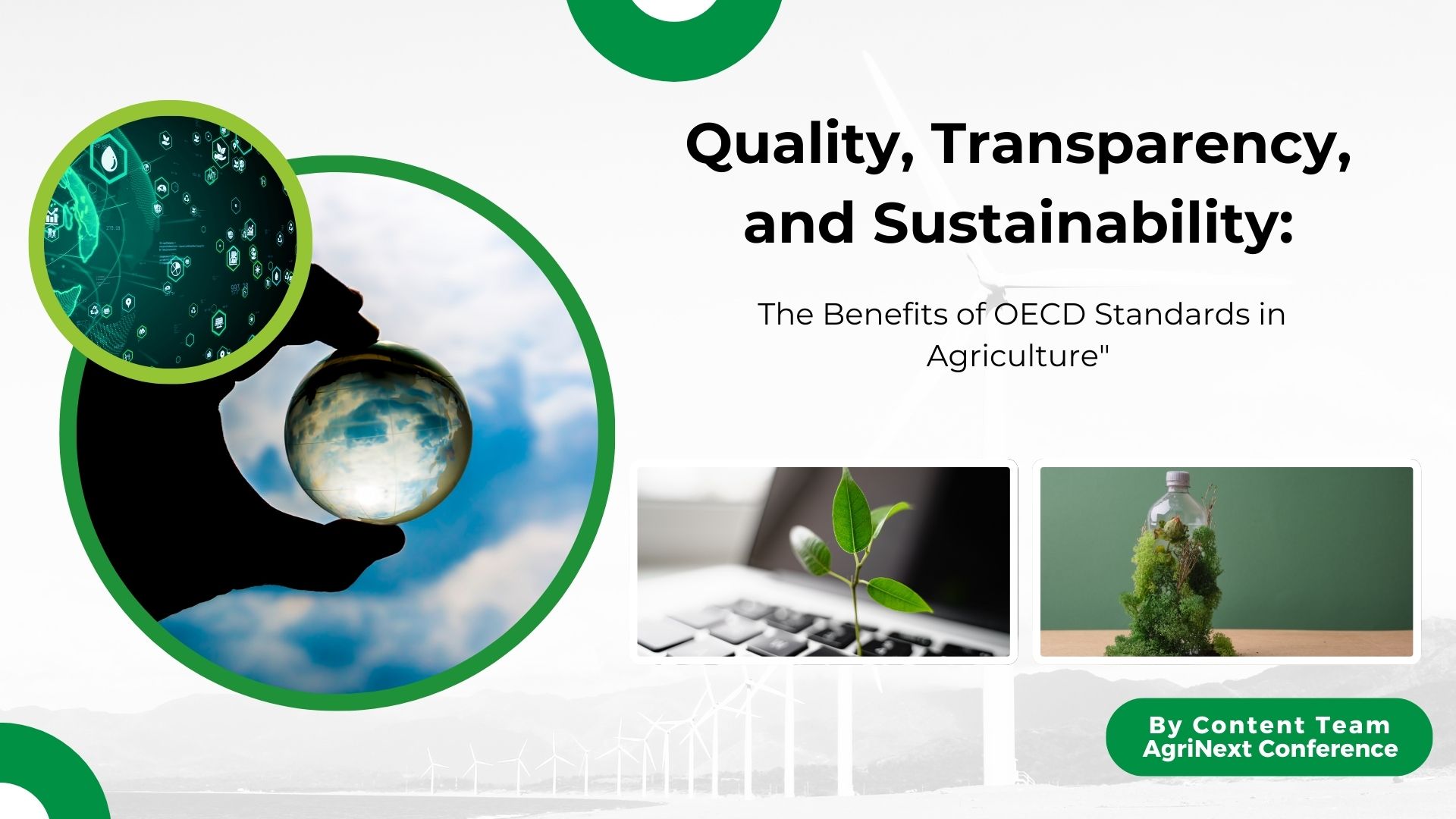
“Well-functioning agricultural markets, reducing food loss and waste, and more productive and less polluting forms of production will remain critically important for global food security and to ensure rural livelihoods can and do benefit from global agrifood value chains.”
OECD Secretary-General Mathias Cormann
Introduction
In the ever-evolving world of agriculture, maintaining high standards of quality, transparency, and sustainability is most important. The Organisation for Economic Co-operation and Development (OECD) plays an important role in setting these standards, providing a framework that helps ensure agricultural practices are efficient, fair and environmentally friendly.
The Organisation for Economic Co-operation and Development (OECD) is an international organization that works to build better policies for better lives. With 38 member countries, it provides a forum where governments can work together to share experiences and seek solutions to common problems.
The OECD promotes policies that improve the economic and social well-being of people around the world, focusing on issues such as education, employment, health, and trade, including the agricultural sector.
The OECD uses rigorous data collection, analysis, and policy recommendations to help countries in addressing the multifaceted challenges facing the agricultural sector. This blog explores the significant benefits of adopting OECD standards in agriculture, highlighting how these guidelines promote better outcomes for farmers, consumers, and the planet.
Understanding OECD Standards for Agriculture
The Organization for Economic Co-operation and Development (OECD) has developed various codes and schemes to make international trade in agriculture smoother and more efficient. These standards help in several important ways:
Simplifying Trade Procedures
By standardizing processes, it becomes easier for countries to trade with each other.
Enhancing Transparency:
Clear rules and guidelines make it easier for everyone to understand what is required, leading to fewer misunderstandings.
Reducing Trade Barriers:
Non-tariff barriers, such as differing national regulations, can make trade difficult. OECD standards help to minimize these obstacles.
Promoting Harmonization: When countries follow the same standards, it is easier to trade, as products are more likely to meet mutual expectations.
Environmental Protection: These standards also encourage practices that are better for the environment, promoting sustainable agriculture.
Benefits of OECD
Standards Quality Control: Ensures that agricultural products meet certain quality benchmarks.
Inspections: Provides for regular checks to maintain quality and safety.
Product Traceability: Enhances the ability to track products from their origin to the consumer, ensuring transparency and trust.
Example: Fruit and Vegetable Trade
Imagine a farmer in Spain growing apples and a buyer in Japan who wants to import these apples. Let’s consider the impact of OECD standards on apples trade between Spain and Japan.
Quality Control: The farmer follows OECD standards for growing and harvesting apples, ensuring they meet high-quality benchmarks. This includes specific criteria for size, color, and ripeness.
Inspections: Before shipping, an inspector verifies that the apples meet these standards. This inspection is based on OECD guidelines, ensuring consistency.
Product Traceability: Each batch of apples is labeled with information about its origin, growing practices, and inspection results. This traceability is important for the buyer in Japan, who can trust the quality and safety of the apples.
Simplified Procedures: The export and import processes are streamlined because both Spain and Japan recognize and adhere to the same OECD standards. This reduces paperwork and speeds up the trade process.
Environmental Protection: The farmer in Spain uses sustainable practices promoted by OECD standards, ensuring that apple production is environmentally friendly.
By adopting OECD standards, Spain can efficiently export high-quality apples to Japan benefiting from reduced trade barriers and increased market access while ensuring environmental sustainability.
By adopting these standards, countries can improve their agricultural trade practices, making it easier for farmers and producers to reach global markets while maintaining high quality and environmental standards.
The OECD-FAO Agricultural Outlook 2023-2032
The report provides a ten-year forecast for agricultural commodity and fish markets on a global, regional, and national level. This report, a collaborative effort between the OECD and FAO, includes input from member countries and international commodity organizations. It serves as a key reference for policy analysis and planning, offering insights into economic and social trends driving the global agri-food sector.
Key Highlights
Rising Input Costs and Food Prices
Recent Increase in agricultural input prices, particularly fertilizers, have raised global food security concerns.The report’s new feature in the Aglink-Cosimo model allows for separate analysis of fertiliser costs, estimating that a 1% increase in fertiliser prices results in a 0.2% increase in agricultural commodity prices.
What is the Aglink-Cosimo Model?
The Aglink-Cosimo model is a comprehensive economic model used by the OECD and the Food and Agricultural Organization (FAO) to generate agricultural market projections. It combines the Aglink model, which was originally developed by the OECD, with the FAO’s Cosimo model. This integrated tool helps analyze the impacts of various factors, such as policy changes, economic trends, and environmental conditions, on agricultural markets.
Food Consumption Projections
Global food consumption is projected to grow by 1.3% annually over the next decade, which is slower than the previous decade due to expected slower population and income growth.
Food Loss and Waste
For the first time, the report includes improved estimates of food consumption by incorporating calculations for food loss and waste.
Assumptions
The projections assume no major changes in weather conditions or policies, providing a baseline for policy and economic analysis.
FAO Director-General QU Dongyu emphasizes the need to improve productivity in low- and middle-income countries to increase local production and farmers’ incomes.
OECD Secretary-General Mathias Cormann highlights that global trade in agricultural commodities will grow, especially due to rising consumption in India and Southeast Asia. Key priorities are enhancing productivity, reducing food loss and waste, and making agriculture more efficient and less polluting to improve food security and rural livelihoods.
Importance for Agriculture and Policy
Economic Analysis
The detailed economic analysis helps understand the impact of input costs on food prices, crucial for policy-making and planning.
Sustainability
Insights into food loss and waste and slower growth in food consumption align with sustainable agricultural practices.
Global Food Security
The report underscores the importance of addressing input price volatility to ensure global food security.
For more detailed information, visit www.agri-outlook.org
Conclusion
The OECD’s contributions to the global agricultural landscape, as exemplified by the OECD-FAO Agricultural Outlook 2023-2032, are a testament to its crucial role in shaping policies that drive sustainable development. By providing comprehensive assessments and forward-looking analyses, the OECD helps countries navigate complex economic and environmental challenges.
The insights from the latest Agricultural Outlook highlight the importance of addressing rising input costs, promoting sustainable practices, and enhancing food security. As we move forward, the OECD’s commitment to evidence-based policymaking and international collaboration will continue to be crucial in building resilient agricultural systems that support both economic growth and environmental sustainability. Through its ongoing efforts, the OECD remains a cornerstone in the pursuit of a balanced and prosperous global economy.
The AgriNext Awards Conference & Expo
The AgriNext Awards Conference & Expo is a premier event dedicated to advancing agricultural technology and innovation. Scheduled for November 13-14, 2024, in Dubai, it brings together industry leaders, innovators, and experts to discuss the latest trends and solutions in agriculture. The conference features a diverse lineup of speakers and exhibitors who focus on cutting-edge topics such as precision agriculture, vertical farming, blockchain technology, and sustainable practices.
Signup For AgriNext Conference Newsletter

